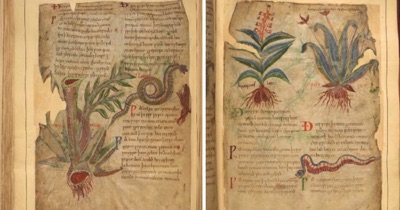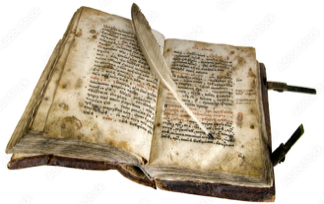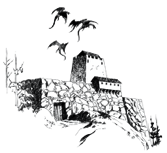TFT Learning Talents through Books by John Paul Bakshoian
The rescue mercenaries were given the remains and possessions of those that did not survive the orc's pogram. While Parso, Galder and the others poked through the piles of victim's belongings for gold, weapons or items of magic, Dexter found a large, beat-up copy of Mechanician Guild of Dran: Text for First Year Mechanix.
Galder chides Dexter for picking such a lame bootie and Dexter blanches. But the older Parso says 'You ignore Gald, the greedy bastard. Your find is the richest yet. Read up, my son, and learn them talents quicker than the rest of us.' Dexter was already placing the book in his satchel next to his Oxford Lexicon and his human-goblin phrasebook.
Books can be used to teach oneself about a subject. A character probably cannot learn the entire subject through books, but it should cut down the cost to learn a new Talent/Language. The character must have Literacy and know the language the book is written in. The Game Master will determine if he wants this system in his game and he should modify these rules to suit his campaign.
Book-Study is meant to be a long-term commitment in a campaign game.
There are 2 study-slots where the character can place any subject(s) he is going to study. He must pay 50 XP to start studying a subject (which will be included in the cost once you graduate) and have an appropriate book on the subject. Once started, those slotted subjects are the only ones you can 'buy' next. If you buy some other Talent/Language not slotted, you forfeit the time invested and the 50XP per slot. However, a character may insert an attribute increase at any time without this loss.
Graduation assumes, of course, that the character also meets any IQ, DX and ability pre-requisites for that talent.
Book-study will allow you to get Talents/Languages/Spells cheaper.
In the evening as his bunkmates ready for drinking downstairs, Dexter prepares his bunk – pillow, blanket, lamp and his text for tonight: First Year Mechanician. “After tomorrow's mission, I should have enough time to enroll in the Danbury Chapter of the Mechanician's Guild. With all this advanced learning I'll finish in half the time and cost.” Reaching for his dictionary, he says “now what is this Flange they keep mentioning.”
When using book-study, normal Talent costs are 50% off. [So a Talent that normally costs 500XP would only cost 250XP with book-study or 1000xp Talent at 500XP.]
However, book-study does not work well with subjects dealing in a lot of physical movement like Brawling (it might offer advice on things not to do, however) or natural abilities like Charisma (though perhaps confidence building affirmations can aid Charisma.) For these talents a character only gets 10% off. Suggested 10% talents are at end of article.
All book-study must be accompanied by a dictionary. Without it, you won't be able to fully understand what you read and will only get 10% off.
Book-study only covers part of the learning, the rest will come from apprenticeship, trial and error, continuous practice or other methods. One would still need to go to Mechanician's Guild or Thieves' Guild to finish certain talents.
Here are some downsides for taking books on a campaign: Books take up valuable backpack space, they could weigh a lot, they could turn to pulp if soaked and they can burn.
Dexter has Mechanician and Goblin Language in the skill slots. Dexter's Player has just completed acquiring a total of 260 XP. Anticipating the need to read some messages in Goblin, Dexter (who has been lugging around his Goblin phrasebook for at least 4 games) cashes in 250 XP, which is ½ the 500XP needed to learn it.
If he had wanted Mechanician instead, he would have to wait until he acquired 500XP (for the 1000xp talent) and at some point he would have to put in time at the Mechanician Guild's school.
A year later, Dexter is reading Smack Doh while training with a Dojo. “You know, I've been practicing this martial art with you for months now and it wasn't until I read in this book about KIAI that it all came together” and with that, 450 XP points and the GMs OK, Dexter was able to acquire Unarmed Combat I.
Unlike the normal way of gaining a new ability (ITL Legacy p45) where 'you may use it immediately as it is assumed that you were practicing or studying during the time you were earning the experience points,' book-learning mechanics takes time.
The GM needs to makes sure that reading of books is adequately represented in the campaign. Whether that is having the character read the material in at least 4 play sessions or having the player describe how the character is studying in longer narrative games.
Types of Study Books
Here are several categories of books, what they have in them and what you can get out of them.
Textbook
This is a book meant to teach a subject. It has theory and goes into detail on the topic, but only for those having the IQ level of the Talent it serves. (Your character will only fully understand the Architecture Textbook when he gains IQ 11, though he can study it at IQ 10.) It might suggest how to train on the subject, but does not give the regimen. Understanding this book may require prerequisites. (The character needs to know Naturalist before he can fully learn Expert Naturalist.) A layman would not get very far casually reading a textbook.
Generalized Book
This gives only brief broad, general knowledge of the topic. Often this only allows you to Talk the Talk* with knowledgeable person on that subject. Reading five generalized books on a subject will give you enough knowledge to acquire the Talent at 50% off as per Textbook.
Manual
Gives specific information on a particular piece of equipment or technique. It is a complex “How To” book. Often 1d6+1 different manuals on a particular subject will aid the character in acquiring the Talent at 50% off.
Language Primer
Gives textbook data on how to speak a language. If it is for the character's own language, then it is oriented for kids' use. Otherwise it is a foreign language primer written in his own language. Kid's primer can be used to gain Literacy talent.
Dictionary of ______
Gives the spelling & meanings of a word and how it is used. Usually hundreds of words in a book, these words can be compiled for a particular language or subject. Might have pictures too. Note that some textbooks and other types of books have glossaries describing certain words in that book. A dictionary is needed to bring understanding to the subject. Without a dictionary, one gains only a 10% reduction in XP cost of any subject.
Magical Tomes
Grimoires dealing with a particular spell. The book gives magic theory, alternate procedures and formulas and incantation process. The esoteric practices are difficult for those not of the wizard class and heroes cannot learn spells this way. Learning spell theory will only give the wizard 10% reduction in XP cost and the character must have a dictionary of magic to start.
Fiction
Stories of made up characters or events. They are a good way of absorbing a culture, mores, geography and history in an entertaining or wearisome way. Not meant for learning talents, but the GM might give a one-time boon for clever referencing to a fiction book. Examples: Area Knowledge, Courtly Graces, Scholar.
Parso, Dexter and crew are surrounded by hordes of guards just itching to commence an arrest that the mercenaries can't win. It is a stand-off. Suddenly [either the player or the GM states] “Dexter says 'this reminds me of the ending of the book Happy Sal against the Debutants. …And then she skipped the bake sale, wrote a check to the PTA and lived happily ever after. Parso, why don't we skip the fight and offer a large contribution to the Guard's Auxilliary fund."
*Talk the Talk = Someone with Talk the Talk is able to converse with people who actually have that particular talent and the talker can pass as a professional. After 15 minutes of talking with a professional on that particular subject, there is a chance that the professional person (by pro's IQ roll) might suspect the poseur as a fake. Acting or other talents may aid the Poseur. However, the poseur is easily found out when they are asked to Walk the Walk.
Walk the Walk = the action of someone actually doing that particular talent.
Inspiration for this article comes from the original ITL p 16 Learning New Talents and languages.
- - - - - - - - - -
Suggested Talents that only get 25% discount instead of 50% in book-study:
Brawling, Weapons, Quick-Draw,
Running, Sex Appeal, Swimming,
Thrown Weapons, Unusual Weapons,
Acute Hearing, Charisma,
Climbing, Diving, Missile Weapon,
Pickpocket, Toughness, Acrobatics,
Mimic, Shield Expertise, Unarmed Combat I, Expert Horseman, Fencer,
Master Pickpocket, Two Weapons,
Unarmed Combat II, Weapon Expertise, Master Armorer, Master Locksmith, Stealth, unarmed Combat III, Master Fencer, Unarmed Combat IV, Weapon Mastery, Unarmed Combat V
Spells must be a wizard to learn.
GMs may adjust book-study discounts as they see fit.




Originally published in The Fanzine Trip.
